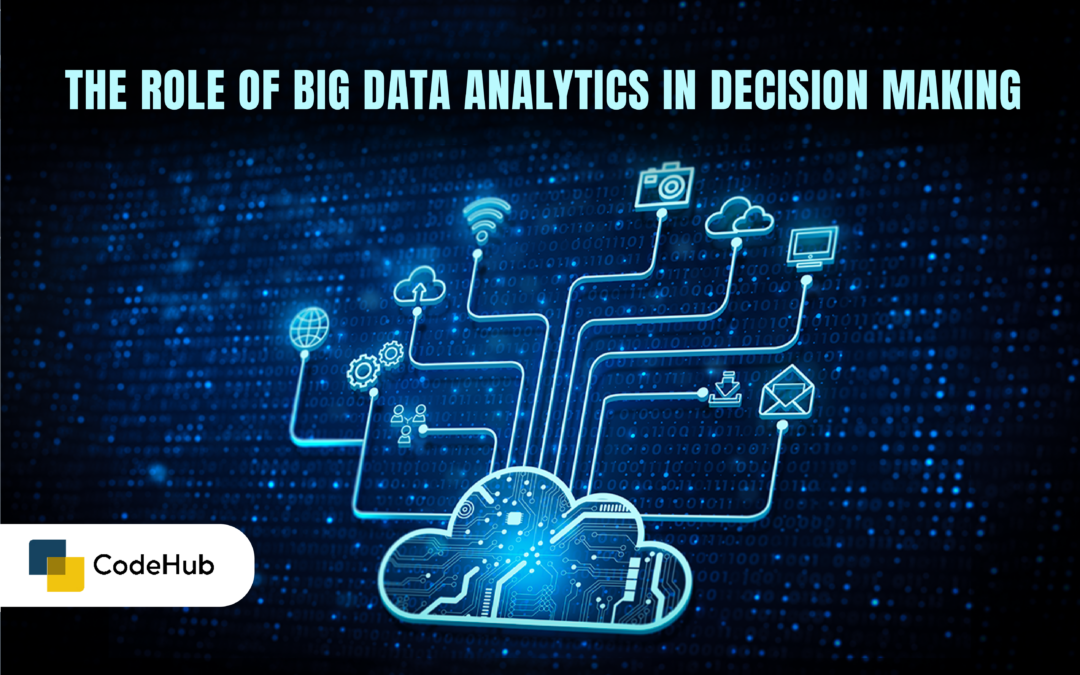Introduction
In the digital age, the proliferation of data has transformed how organizations operate and make decisions. Big Data Analytics has emerged as a critical tool, enabling businesses to harness vast amounts of data to gain insights, improve efficiencies, and drive strategic decision-making. This blog post delves into the role of Big Data Analytics in decision-making, highlighting its impact across various sectors and how organizations can leverage this powerful tool to stay competitive.
Enhancing Decision-Making with Big Data Analytics
Big Data Analytics refers to the process of examining large and varied data sets to uncover hidden patterns, unknown correlations, market trends, customer preferences, and other useful business information. This analysis supports decision-making by providing a comprehensive view of the business environment and enabling data-driven strategies.
Improved Accuracy and Precision
Traditional decision-making often relies on intuition and limited data, which can lead to inaccuracies. Big Data Analytics, however, uses sophisticated algorithms and statistical models to analyze vast datasets, ensuring more accurate and precise insights. This data-driven approach reduces the margin of error and enhances the reliability of decisions.
Predictive Analytics
One of the most powerful aspects of Big Data Analytics is its ability to predict future trends and behaviors. Predictive analytics uses historical data and machine learning techniques to forecast future events. For instance, in retail, predictive analytics can anticipate customer demand, allowing businesses to optimize inventory levels and improve customer satisfaction. In finance, it can predict market movements, enabling better investment decisions.
Applications Across Various Sectors
Big Data Analytics is revolutionizing decision-making across a wide range of industries. Here are a few examples of its impact:
Healthcare
In healthcare, Big Data Analytics helps in improving patient outcomes and operational efficiency. By analyzing patient data, healthcare providers can identify patterns and predict disease outbreaks, optimize treatment plans, and reduce hospital readmissions. Additionally, it aids in personalized medicine by tailoring treatments based on individual patient data.
Retail
Retailers use Big Data Analytics to enhance customer experience and drive sales. By analyzing customer behavior, preferences, and purchase history, retailers can offer personalized recommendations, optimize pricing strategies, and improve inventory management. This leads to increased customer loyalty and higher sales conversions.
Finance
The financial sector leverages Big Data Analytics for risk management, fraud detection, and investment strategies. By analyzing transaction data and market trends, financial institutions can identify fraudulent activities in real-time, assess credit risk more accurately, and develop sophisticated trading algorithms.
Manufacturing
In manufacturing, Big Data Analytics improves production efficiency and quality control. By monitoring data from sensors and machinery, manufacturers can predict equipment failures, optimize maintenance schedules, and enhance product quality. This results in reduced downtime, lower costs, and higher productivity.
Overcoming Challenges in Big Data Analytics
While Big Data Analytics offers significant benefits, it also presents challenges that organizations must address to realize its full potential.
Data Quality and Integration
Ensuring the quality and integration of data from various sources is crucial. Inaccurate or incomplete data can lead to erroneous insights and poor decision-making. Organizations must implement robust data governance frameworks and use data cleaning and integration tools to maintain data integrity.
Scalability
As data volumes grow, scalability becomes a critical issue. Organizations need scalable infrastructure and tools that can handle large datasets efficiently. Cloud computing and distributed processing technologies, such as Hadoop and Spark, are essential for managing and analyzing big data at scale.
Privacy and Security
With the increasing amount of data, privacy and security concerns are paramount. Organizations must implement stringent data protection measures and comply with regulations such as GDPR to safeguard sensitive information. This includes encrypting data, implementing access controls, and regularly auditing data practices.
Strategic Implementation of Big Data Analytics
To effectively leverage Big Data Analytics, organizations should adopt a strategic approach:
- Define Objectives: Clearly define the business objectives and the specific questions that Big Data Analytics will address. This ensures that the analysis is focused and aligned with organizational goals.
- Invest in Technology: Invest in the right technologies and tools that support Big Data Analytics. This includes data storage solutions, analytics platforms, and visualization tools.
- Build a Skilled Team: Assemble a team with the necessary skills in data science, analytics, and domain expertise. Continuous training and development are essential to keep the team updated with the latest advancements.
- Foster a Data-Driven Culture: Encourage a data-driven culture within the organization where data and analytics are integral to decision-making processes. This involves promoting data literacy and ensuring that stakeholders have access to relevant data insights.
Conclusion
Big Data Analytics is a game-changer in decision-making, providing organizations with deeper insights, enhanced accuracy, and predictive capabilities. By strategically implementing Big Data Analytics, businesses can unlock new opportunities, improve operational efficiencies, and stay ahead in a competitive landscape. Embracing this technology is not just about keeping up with trends; it’s about leveraging data as a strategic asset to drive informed and impactful decisions.

